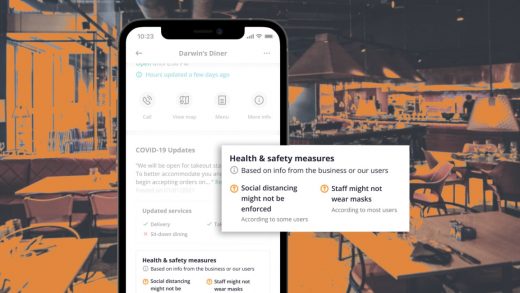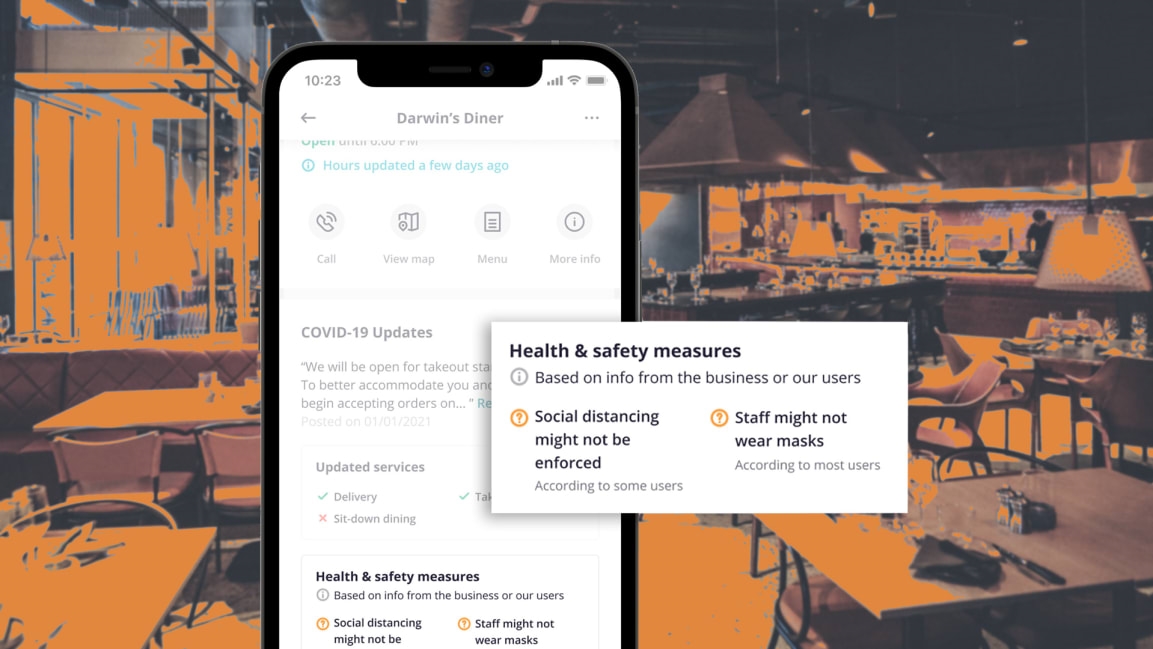Now Yelp’s users get to report on COVID-19 safety measures
Over its sixteen-year history, Yelp has helped untold numbers of consumers answer such vital questions as whether a particular eatery’s vibe skews kid-friendly or romantic. But starting more than 10 months ago, as the COVID-19 pandemic wreaked havoc with local commerce, such matters were overwhelmed by others of a sobering, even dire nature.
Suddenly, mundane facts such as operating hours were subject to abrupt change after abrupt change. Depending on restrictions in place, your hairstylist might be tending to clients at greatly reduced capacity—possibly outside on the sidewalk—or have temporarily closed. You might even have been left wondering if it was even safe to visit a cherished neighborhood institution at all, assuming it had managed to stay in business.
It was obvious right away that Yelp would need to help consumers and businesses deal with these unwelcome new issues. It did. However, rather than being something that the San Francisco-based company could address with a few quick fixes, COVID-19 turned out to be a gnarly problem that has required multiple rounds of thinking, design changes, and additional functionality.
That’s why Yelp is only now getting around to adding two useful pieces of information as reported by its own users: whether or not a business is enforcing social distancing and (successfully) requiring its employees to wear masks. The company is publishing these data points only after working through how to do so in a way that’s meaningful, easy to understand, and fair to the establishments in question. For the moment, at least, they’re a reason to consult Yelp rather than Google, which continues to update its own COVID-19 safety data on businesses but isn’t calling out ones whom users report as falling short.
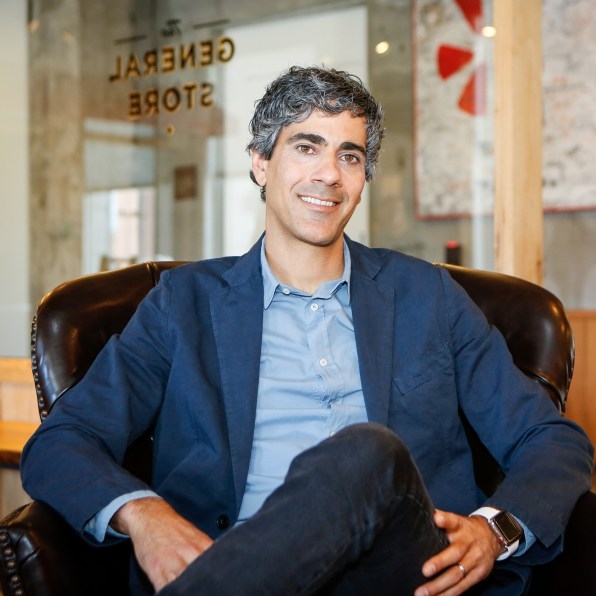
[Photo: courtesy of Yelp]
Confronting these issues involves Yelp inserting itself into inherently touchy territory. And if a business’s COVID-19 compliance report card is iffy, it may be more upset with the company than with the users who provided the data behind the scores.
So be it, says Yelp cofounder and CEO Jeremy Stoppelman. “I think part of why Yelp, the brand, resonates with consumers, and the content is trusted in a way that you don’t find on other review platforms is because Yelp has always been willing to do the hard things,” he told me. “The business owner community hasn’t always loved that they can’t control their reputation on Yelp, but ultimately it’s very valuable for consumers for us to take that and try to make sure that they’re getting the best, most reliable information.”
Shared pain
Perhaps more than any other brand-name tech platform, Yelp’s fate is inextricably bound with those of restaurants, retailers, and local service providers of every sort. The company makes money when they pay it for ad space and other services that help them reach customers. As many of its clients faced an existential threat from the pandemic, the impact on its own bottom line was dramatic.
“By mid-March we started to see effects show up in the business, and it was quite bad,” says Stoppelman. “A lot of advertisers were pausing their programs.” In April, Yelp took the painful step of laying off 1,000 employees and furloughing another 1,100. It later reinstated most of the latter group, and referral fees from service providers such as home-improvement companies—a source of revenue that remained robust—helped stave off even worse financial repercussions.
Even as Yelp faced its own ugly reality, it was working to help its customers deal with theirs. For instance, it gave away $35 million in advertising and other services so that businesses could still benefit from them even if they seemed unaffordable at the moment.
The last thing a business struggling to keep afloat needs is to be flamed by customers who won’t cut it any slack.
Just as important, it made sure that the familiar Yelp experience was up to the job of serving consumers during the utterly unfamiliar time we find ourselves in. “That’s been a big focus of ours, figuring out what can we uniquely step in and provide that helps consumers transact with business owners efficiently in this very crazy and rapidly-changing environment,” says Stoppelman.
These adjustments spanned the entire service and included its best-known feature, the reviews posted by real people. The last thing a business struggling to keep afloat needs is to be flamed by customers who won’t cut it any slack. So Yelp adjusted the process of leaving a review by adding reminders such as “Many businesses are doing their best during COVID. Thank you in advance for taking this into consideration if things didn’t go as planned.”
The company also instituted a new policy that prohibited reviews that, for instance, are “harsh on a business because they had to shut down or change their hours, maybe even due to a government mandate that the people weren’t aware of,” says chief product officer Vivek Patel. As of the end of November, it had deleted more than 4,000 reviews for COVID-19-related unreasonableness.
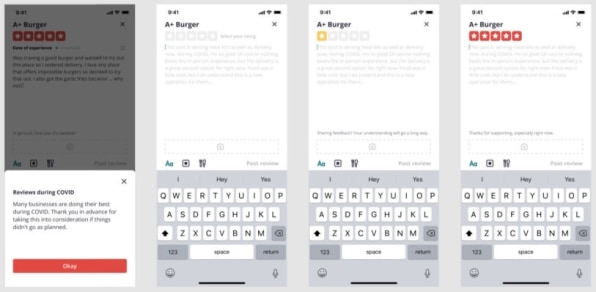
[Image: courtesy of Yelp]
Meanwhile, Yelp’s waitlist service, which allows restaurants to give their patrons the option of remotely securing a place in line before arriving in person, made a lot of sense for a moment when people are trying to avoid crowds. But the company reworked it to reflect current operational needs. “Previously, the wait time was completely decided by the system,” says Yelp head of consumer product Akhil Ramesh. “Now, if you’re trying to operate at a capacity, the business owner has to be able to tweak the timing.”
The single most pressing need may have been simply to keep consumers informed about what to expect from businesses as they grappled with COVID-19 restrictions. A for-pay feature for businesses called Yelp Connect, introduced in September 2019, allowed them to post newsy announcements, a format that turned out to be well-suited to pandemic-related updates. Patel describes it as “a mechanism by which you can keep people who frequented your business up to date on how they should interact with you, or what’s changing. Are you doing meal kits this week? Are you doing to-go cocktails? Are you introducing family meals?”
Similarly, Yelp put dedicated space at the top of each listing that allows businesses to share news about their current state of operation for free. “We called it a COVID-19 banner and gave them a canvas to just express what’s most critical for their customers to know,” says Patel. “And that was something that got a lot of traction.” In the last four months of 2020, Yelp says, overall consumer interest spiked 41 percent for businesses that provided COVID-19 updates in their listings.
To present such information in a more organized fashion, Yelp added some new fields that businesses can fill out for themselves. For instance, restaurants can specify if they offer amenities such as heated outdoor dining and contactless menus. Beauty and fitness businesses can indicate if they’re offering outdoor service; fitness businesses can also note if clients can sign up for one-on-one sessions. As an establishment updates such information, Yelp will use push notifications to alert users who have recently reviewed, bookmarked, or otherwise interacted with it.
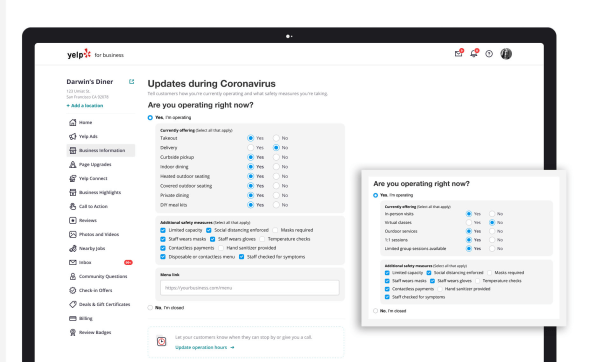
[Photo: courtesy of Yelp]
It was clear, however, that Yelp couldn’t depend entirely on businesses to convey vital information about themselves. For one thing, not all of them are diligent about doing so. For another, some questions couldn’t be objectively answered by the businesses themselves, any more than you’d rely on a restaurant’s own assessment of whether its food tastes good.
So when it came to tracking how well businesses were complying with COVID-19 safety practices, Yelp decided to call on the help of its community of users—the same people who have posted a cumulative total of more than 220 million reviews on the service. Along with letting them report on details such as whether restaurants offers indoor dining, outdoor seating, delivery, takeout, and/or curbside pickup, it now asks about safety-specific factors relating to masks and gloves, temperature checks, sanitizing between customers, and the like.
We’re saying, ‘Look, social distancing might not be enforced, but it’s only according to some users.’ ”
Akhil Ramesh, Yelp
Of all these safety topics, Yelp has chosen for now to spotlight social distancing and employee mask-wearing in business listings. That was for multiple reasons: “We want to make sure that whatever we do is fair, and this is something that can be observed well and something that has a lot of feedback associated with it,” says Ramesh. “And it’s also pretty clear that these two [data points] are super, super fundamental.”
Yelp displays this information only for establishments that have received a critical mass of reports from logged-in users, and considers only reports from the most recent 28 days. If reports indicate that a business is enforcing a policy, it will get a green checkmark for that category. If reports of non-compliance are common, it will get an orange question mark.
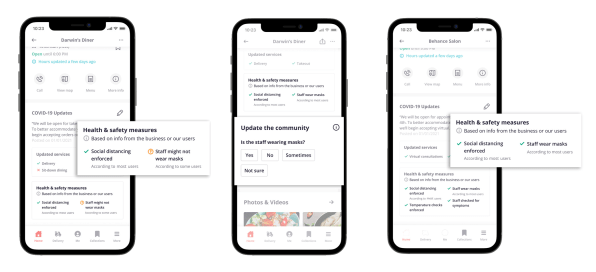
Getting a question mark in one or both categories won’t be a good look. But even then, Yelp will indicate that the negative report is according to either “most users” or “some users,” acknowledging that your experience could differ. “We’re trying to be transparent to consumers,” explains Ramesh. “We’re saying, ‘Look, social distancing might not be enforced, but it’s only according to some users.’” Listings will also ask users if their experience jibes with what others have found—and if they say “no,” they’ll get the opportunity to add their own response to the aggregate data.
In the end, one takeaway from Yelp’s data collection so far is that the overwhelming majority of businesses are meeting the minimum standard of social distancing and mask-wearing. “We did a dry run recently with all the systems in place, and we’ve seen about a couple hundred that are egregious offenders,” says Ramesh. “This is just meant to catch people that we know, confidently, are off-target. They’ve claimed that they’ve put something in place, but they haven’t enforced it. Most of them are doing a great job, and that’s a great thing.”
Like everybody else, Yelp is crossing its fingers that widespread availability of vaccines will restore some semblance of normalcy to everyday life. “There was a period there where people started going out more and we saw that in our data with reservations and waitlists ticking up dramatically,” says Patel. “And so I anticipate that we’re going to have that happen again this year.”
If that scenario pans out, it will be a relief for consumers, local businesses, and—of course—Yelp. But it won’t mean that consumers are likely to lose interest in the company’s new COVID-19 safety details any time soon. Actually, Stoppelman says, signs of progress could spur a demand for even more information. “I could see people asking, ‘Okay, it’s great that you tell me that employees are wearing masks, but are they vaccinated?’” he muses. “We haven’t tackled that. There will be new and interesting challenges, I’m sure.”
Fast Company , Read Full Story
(15)

